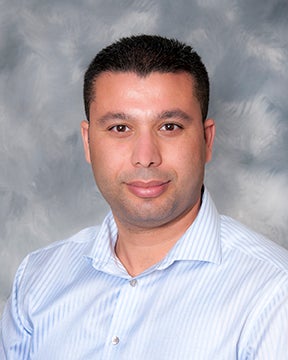Don’t Hit Snooze on Sleep Issues
February 18, 2025Categories: Sleep, News & Media, Health & Wellness, Blog
Tags: Sleep, News & Media, Health & Wellness, Blog

Spring is a little over a month away, and soon it will be time to "Spring Forward"! On Sunday, March 9 at 2:00 a.m. it will be time to set our clocks ahead by one hour to enter Daylight Savings Time (DST). According to the CDC, switching to Daylight Savings Time can disturb sleep, cause health issues, and lead to an increase in traffic accidents and work-safety events.
As part of the upcoming Sleep Awareness Month in March, Samer El Zarif, M.D., the Associate Medical Director for Pulmonary, Critical Care and Sleep Medicine Services for Garnet Health Doctors, provides information on the importance of sleep, tips for healthy sleep hygiene practices, and some of the most common sleep disorders.
Sleep. Everyone needs it—the mental and physical health benefits are widely reported. And yet it’s clear that so many don’t get enough of it. According to the Centers for Disease Control and Prevention (CDC), nearly a third of adults get less than the recommended seven hours of sleep per night.
Practicing good sleep hygiene can vastly improve the quality of your sleep, which in turn can improve your overall health and well-being. Good sleep hygiene refers to the set of habits and practices that promote better sleep quality and duration. The CDC offers these recommendations for better sleep.
- Stick to a consistent sleep schedule. Going to bed and waking up at the same time every day, even on weekends, can help regulate your circadian rhythms and promote better sleep.
- Create a relaxing sleep environment. Keep your bedroom cool, quiet, relaxing and dark.
- Eliminate electronics and screens. Remove electronic devices such as TVs, computers and smartphones from the bedroom.
- Limit caffeine and alcohol intake. Both can disrupt sleep patterns and should be consumed in moderation, especially in the hours leading up to bedtime. Also try to avoid eating large meals before bedtime.
- Exercise regularly. Physical activity during the day can make falling asleep easier at night.
- Manage stress. Stress and anxiety can make it difficult to fall asleep. Practice relaxation techniques like deep breathing or meditation to calm your mind before bed.
But what if you have tried these tips and are still not getting a full and rested night’s sleep? The Center for Sleep Medicine at Garnet Health Medical Center—accredited by the American Academy of Sleep Medicine—can help you rest easy. We can help determine the root cause of your sleep issues, for adults and children over the age of 2. Below are the most common sleep disorders we see.
Obstructive Sleep Apnea
Obstructive sleep apnea (OSA) is one of the most common sleep disorders, affecting over 25 million U.S. adults, but 80% of cases remain undiagnosed, according to the American Academy of Sleep Medicine. OSA is characterized by paused or restricted breathing while sleeping, which affects oxygen levels in the blood and brain. It has been associated with conditions such as high blood pressure, coronary artery disease and heart attack.
While snoring is most often cited as a symptom, other warnings signs of OSA include daytime sleepiness, fatigue, headaches, waking up with a dry mouth or sore throat, restless sleep or waking up often, frequent trips to the bathroom to urinate during the night, and reduced focus during the day.
Treatment options for sleep apnea include CPAP therapy and oral appliances—and for those who qualify, surgery.
Insomnia
Insomnia affects 10%–30% of the general population and can become chronic in 10% of cases. Insomnia is defined as having difficulty falling or remaining asleep. It can also mean waking up very early and not being able to fall back asleep. There are several factors that can lead to insomnia. Doctors will work to determine the cause then prescribe the appropriate treatment, which can take the form of behavioral therapy and/or sleep aids.
Narcolepsy
Narcolepsy is a sleep disorder where, despite getting enough nighttime sleep, one becomes overwhelmingly sleepy during the day. Sudden muscle weakness can also occur, resulting in a “sleep attack,” where a person slumps over as they suddenly fall asleep. Narcolepsy episodes can happen anywhere and usually last for several minutes.
People with narcolepsy can be at risk for accidents and injury, so it’s important to get a proper diagnosis and treatment.
Restless Legs Syndrome
The time when you should feel most at ease and still can actually trigger restless legs syndrome (RLS). It can best be described as a tingling or painful crawling sensation up and down the legs while lying down, making it difficult to fall asleep. Many feel the need to move or kick to help alleviate the pain. There are various treatments for RLS, including dietary changes, exercise, medical devices and medication.
A 2024 survey from the American Academy of Sleep Medicine reveals that 51% of Americans have never talked to their healthcare provider about their sleep issues. If you’ve been experiencing any symptoms of restless sleep, Garnet Health’s sleep specialists can help. Once your sleep-disorder symptoms are confirmed, we can develop a sleep study to aid in diagnosis and appropriate treatment. And you can choose to have your sleep study in a specialized sleep center or from the comfort of your home!
Don’t go another night with sleep issues. Visit garnethealth.org/sleepcenter or call Garnet Health Doctors at (845) 333-7575 today to make an appointment with a sleep medicine specialist.
